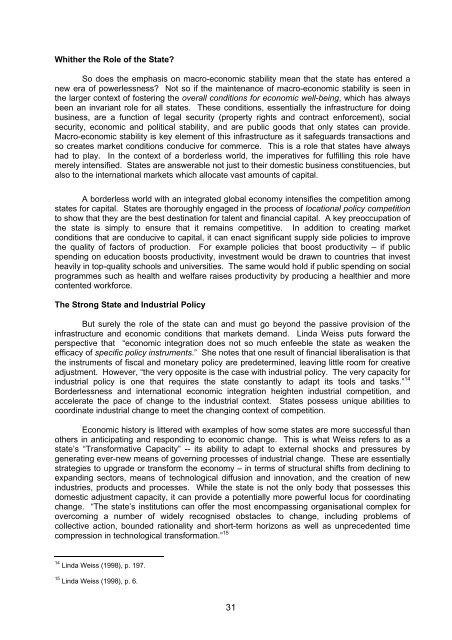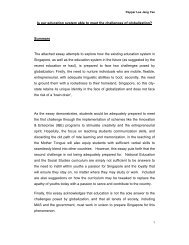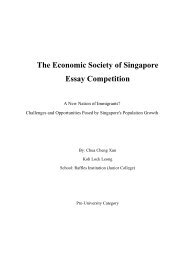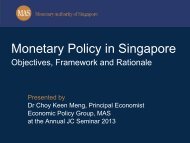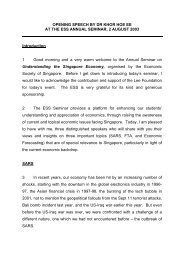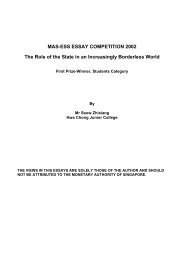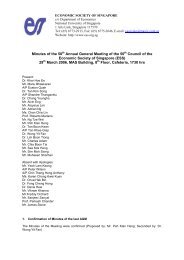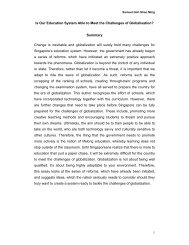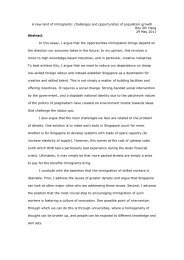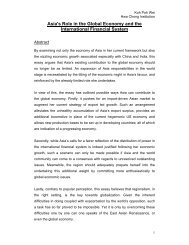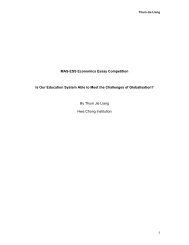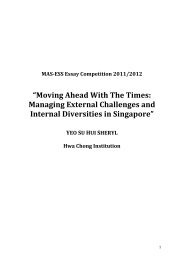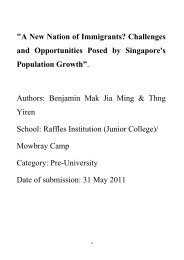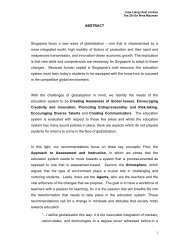the role of the state in an increasingly borderless world - Economic ...
the role of the state in an increasingly borderless world - Economic ...
the role of the state in an increasingly borderless world - Economic ...
- No tags were found...
You also want an ePaper? Increase the reach of your titles
YUMPU automatically turns print PDFs into web optimized ePapers that Google loves.
Whi<strong>the</strong>r <strong>the</strong> Role <strong>of</strong> <strong>the</strong> State<br />
So does <strong>the</strong> emphasis on macro-economic stability me<strong>an</strong> that <strong>the</strong> <strong>state</strong> has entered a<br />
new era <strong>of</strong> powerlessness Not so if <strong>the</strong> ma<strong>in</strong>ten<strong>an</strong>ce <strong>of</strong> macro-economic stability is seen <strong>in</strong><br />
<strong>the</strong> larger context <strong>of</strong> foster<strong>in</strong>g <strong>the</strong> overall conditions for economic well-be<strong>in</strong>g, which has always<br />
been <strong>an</strong> <strong>in</strong>vari<strong>an</strong>t <strong>role</strong> for all <strong>state</strong>s. These conditions, essentially <strong>the</strong> <strong>in</strong>frastructure for do<strong>in</strong>g<br />
bus<strong>in</strong>ess, are a function <strong>of</strong> legal security (property rights <strong>an</strong>d contract enforcement), social<br />
security, economic <strong>an</strong>d political stability, <strong>an</strong>d are public goods that only <strong>state</strong>s c<strong>an</strong> provide.<br />
Macro-economic stability is key element <strong>of</strong> this <strong>in</strong>frastructure as it safeguards tr<strong>an</strong>sactions <strong>an</strong>d<br />
so creates market conditions conducive for commerce. This is a <strong>role</strong> that <strong>state</strong>s have always<br />
had to play. In <strong>the</strong> context <strong>of</strong> a <strong>borderless</strong> <strong>world</strong>, <strong>the</strong> imperatives for fulfill<strong>in</strong>g this <strong>role</strong> have<br />
merely <strong>in</strong>tensified. States are <strong>an</strong>swerable not just to <strong>the</strong>ir domestic bus<strong>in</strong>ess constituencies, but<br />
also to <strong>the</strong> <strong>in</strong>ternational markets which allocate vast amounts <strong>of</strong> capital.<br />
A <strong>borderless</strong> <strong>world</strong> with <strong>an</strong> <strong>in</strong>tegrated global economy <strong>in</strong>tensifies <strong>the</strong> competition among<br />
<strong>state</strong>s for capital. States are thoroughly engaged <strong>in</strong> <strong>the</strong> process <strong>of</strong> locational policy competition<br />
to show that <strong>the</strong>y are <strong>the</strong> best dest<strong>in</strong>ation for talent <strong>an</strong>d f<strong>in</strong><strong>an</strong>cial capital. A key preoccupation <strong>of</strong><br />
<strong>the</strong> <strong>state</strong> is simply to ensure that it rema<strong>in</strong>s competitive. In addition to creat<strong>in</strong>g market<br />
conditions that are conducive to capital, it c<strong>an</strong> enact signific<strong>an</strong>t supply side policies to improve<br />
<strong>the</strong> quality <strong>of</strong> factors <strong>of</strong> production. For example policies that boost productivity – if public<br />
spend<strong>in</strong>g on education boosts productivity, <strong>in</strong>vestment would be drawn to countries that <strong>in</strong>vest<br />
heavily <strong>in</strong> top-quality schools <strong>an</strong>d universities. The same would hold if public spend<strong>in</strong>g on social<br />
programmes such as health <strong>an</strong>d welfare raises productivity by produc<strong>in</strong>g a healthier <strong>an</strong>d more<br />
contented workforce.<br />
The Strong State <strong>an</strong>d Industrial Policy<br />
But surely <strong>the</strong> <strong>role</strong> <strong>of</strong> <strong>the</strong> <strong>state</strong> c<strong>an</strong> <strong>an</strong>d must go beyond <strong>the</strong> passive provision <strong>of</strong> <strong>the</strong><br />
<strong>in</strong>frastructure <strong>an</strong>d economic conditions that markets dem<strong>an</strong>d. L<strong>in</strong>da Weiss puts forward <strong>the</strong><br />
perspective that “economic <strong>in</strong>tegration does not so much enfeeble <strong>the</strong> <strong>state</strong> as weaken <strong>the</strong><br />
efficacy <strong>of</strong> specific policy <strong>in</strong>struments.” She notes that one result <strong>of</strong> f<strong>in</strong><strong>an</strong>cial liberalisation is that<br />
<strong>the</strong> <strong>in</strong>struments <strong>of</strong> fiscal <strong>an</strong>d monetary policy are predeterm<strong>in</strong>ed, leav<strong>in</strong>g little room for creative<br />
adjustment. However, “<strong>the</strong> very opposite is <strong>the</strong> case with <strong>in</strong>dustrial policy. The very capacity for<br />
<strong>in</strong>dustrial policy is one that requires <strong>the</strong> <strong>state</strong> const<strong>an</strong>tly to adapt its tools <strong>an</strong>d tasks.” 14<br />
Borderlessness <strong>an</strong>d <strong>in</strong>ternational economic <strong>in</strong>tegration heighten <strong>in</strong>dustrial competition, <strong>an</strong>d<br />
accelerate <strong>the</strong> pace <strong>of</strong> ch<strong>an</strong>ge to <strong>the</strong> <strong>in</strong>dustrial context. States possess unique abilities to<br />
coord<strong>in</strong>ate <strong>in</strong>dustrial ch<strong>an</strong>ge to meet <strong>the</strong> ch<strong>an</strong>g<strong>in</strong>g context <strong>of</strong> competition.<br />
<strong>Economic</strong> history is littered with examples <strong>of</strong> how some <strong>state</strong>s are more successful th<strong>an</strong><br />
o<strong>the</strong>rs <strong>in</strong> <strong>an</strong>ticipat<strong>in</strong>g <strong>an</strong>d respond<strong>in</strong>g to economic ch<strong>an</strong>ge. This is what Weiss refers to as a<br />
<strong>state</strong>’s “Tr<strong>an</strong>sformative Capacity” -- its ability to adapt to external shocks <strong>an</strong>d pressures by<br />
generat<strong>in</strong>g ever-new me<strong>an</strong>s <strong>of</strong> govern<strong>in</strong>g processes <strong>of</strong> <strong>in</strong>dustrial ch<strong>an</strong>ge. These are essentially<br />
strategies to upgrade or tr<strong>an</strong>sform <strong>the</strong> economy – <strong>in</strong> terms <strong>of</strong> structural shifts from decl<strong>in</strong><strong>in</strong>g to<br />
exp<strong>an</strong>d<strong>in</strong>g sectors, me<strong>an</strong>s <strong>of</strong> technological diffusion <strong>an</strong>d <strong>in</strong>novation, <strong>an</strong>d <strong>the</strong> creation <strong>of</strong> new<br />
<strong>in</strong>dustries, products <strong>an</strong>d processes. While <strong>the</strong> <strong>state</strong> is not <strong>the</strong> only body that possesses this<br />
domestic adjustment capacity, it c<strong>an</strong> provide a potentially more powerful locus for coord<strong>in</strong>at<strong>in</strong>g<br />
ch<strong>an</strong>ge. “The <strong>state</strong>’s <strong>in</strong>stitutions c<strong>an</strong> <strong>of</strong>fer <strong>the</strong> most encompass<strong>in</strong>g org<strong>an</strong>isational complex for<br />
overcom<strong>in</strong>g a number <strong>of</strong> widely recognised obstacles to ch<strong>an</strong>ge, <strong>in</strong>clud<strong>in</strong>g problems <strong>of</strong><br />
collective action, bounded rationality <strong>an</strong>d short-term horizons as well as unprecedented time<br />
compression <strong>in</strong> technological tr<strong>an</strong>sformation.” 15<br />
14 L<strong>in</strong>da Weiss (1998), p. 197.<br />
15 L<strong>in</strong>da Weiss (1998), p. 6.<br />
31


